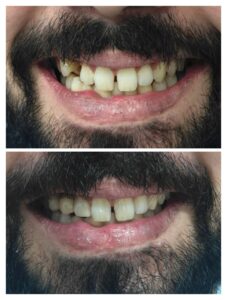Dental Implants
Let’s walk you through the best way to replace a missing tooth or teeth in your jaw. Replacing missing teeth can restore your smile, confidence and improve your overall health.
What is an Implant?
Implants are artificial tooth roots made of titanium that are placed in your jawbone. They replicate your missing root and provide the foundation for the prosthesis which can be a single tooth, bridge or denture. This looks and functions like a natural tooth.

Types of Implant Prosthesis:
Implants are an excellent choice for replacing a single tooth, multiple teeth or even an entire arch. They provide the comfort and strength our natural teeth provide. There are various types based on the number of missing teeth that need replacement.
Single tooth implant:
This type of implant replaces a single missing tooth with an artificial tooth thereby restoring function and esthetics.
Replacement of multiple teeth: If you have lost multiple teeth on one side of your jaw an implant bridge is a good choice. An implant supported bridge replaces continuous multiple missing teeth in an arch, Implants are used as anchors to support the bridge.
Full Arch Replacement:
Also called “all on 4 Implants”. This type of replacement is done for completely edentulous jaws (no teeth). Implants are strategically placed in the jaw for supporting the prosthesis that replaces the entire jaw of missing teeth.
Implant supported dentures: Removable complete dentures are uncomfortable. Dentures can be secured on the jaw with implants to increase stability,comfort and reduce the movement while chewing.
Procedure:
Implant procedures vary based on the number of missing teeth, overall medical health of the patient and patient requirement.
We will explain the basic procedure of implants, each and every patient is different and we provide custom made treatment plans to suit your individual needs
Initial Assessment:
In this phase, a detailed medical and dental history is taken.
A few blood tests, x-ray and 3D scan like cbct will be required for treatment planning. We will assess the patient’s fitness, bone health and quality and decide the size, position and type of implant that can be placed in the jaw.
A detailed treatment plan with estimates will be given to the patient at the end of the initial assessment phase.
Surgical phase:
During this phase the implants will be placed in the jaw, in most cases a temporary replacement of missing teeth is given. The healing period for this surgical procedure is a week to 10 days.
Healing phase:
After placement implants undergo a process called osseointegration. This basically means the bone will slowly grow around the threads of the titanium implants and lock it in the jaw and provide a strong foundation for the prosthesis. This process takes 3-6 months
Prosthetic Phase:
During this phase, the crown portion or the missing teeth are placed . For that we use connector posts called abutments which are placed in the implant and new teeth are either cemented or screwed on the abutment.
Benefits of Implants:
They are the best alternatives to missing teeth replacement. Compared to other options like bridges and dentures they do not rely on neighbouring teeth for support thereby maintaining the health of other teeth and gums.
They prevent bone loss and maintain facial structure. Loss of teeth can speed the ageing process.
Implants offer stability and durability as compared to other methods of replacement and are long lasting.
The replicate the natural teeth in strength, esthetics and function.
Complications:
Some of the common complications include failure of implant/ rejection, infection, nerve damage and sinus problems. Frequent checkups and regular follow ups can prevent or control the complications
If you’re looking for a dental implant clinic in Indiranagar, our expert team is ready to provide high-quality care tailored to your needs.
FAQ’s
In some cases, immediate implants are given, a proper evaluation and case selection is required for this procedure.
Yes. With proper care, regular follow up with the dentist they can last a lifetime.
Yes, Implants are designed to look, feel and function like natural teeth.
Dental Implants have shown a 95% success rates and is influenced by factors like bone quality, overall health and oral hygiene.
There is no age limit for dental implants as long as the person is healthy and has a good jaw bone.
Although smoking affects the success of dental implants, you can still get a dental implant with proper evaluation and care.

